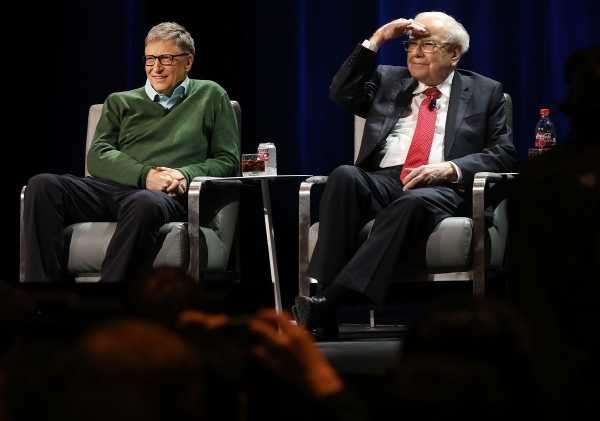
This story is part of a group of stories called

Uncovering and explaining how our digital world is changing — and changing us.
Warren Buffett announced on Wednesday that he’s donating $4.1 billion of Berkshire Hathaway shares to five foundations — and he’s stepping down from his role as a trustee of the Bill & Melinda Gates Foundation, one of the largest philanthropies in the world. The Berkshire Hathaway CEO made the announcement as he shared the latest update on his charitable giving, while defending the pace at which he’s been donating his immense fortune. Now 90 years old, Buffett says he’s halfway toward his goal of giving up nearly all of his net worth.
Buffett was not specific about why he is resigning from the Gates Foundation, which has been a primary beneficiary of his donations for more than a decade. In his letter, the billionaire noted that his goals were “100% in sync” with the foundation, that he’d been an “inactive trustee,” and that he’d resigned from “all other corporate boards other than Berkshire Hathaway.”
Buffett’s announcement comes less than two months after Bill and Melinda Gates announced their divorce and as Bill Gates faces ongoing scrutiny over past workplace conduct and extramarital affairs. The focus of Buffett’s letter, however, seems to address how he approaches philanthropy at a time of intense criticism of wealth inequality and billionaire power. Buffett generally defended his accumulation of wealth, and seems to be arguing that the benefits of compounding interest have justified his gradual approach to selling off his shares.
Meanwhile, the $4.1 billion donation is not necessarily surprising. The business magnate has been talking about giving away most of his wealth since at least 2006, when he announced he would donate most of his wealth to the Gates Foundation. He’s since made regular large donations of Berkshire Hathaway shares to the foundation, and in 2010, he worked with the Gateses to establish the Giving Pledge, a public pact among the ultrarich to donate at least half of their wealth to charity. Many billionaires, including MacKenzie Scott and Mark Zuckerberg, have since signed on. Now that it’s been 15 years since his original announcement about giving to the Gates Foundation, Buffett recognizes that philanthropy is complicated.
“The easiest deed in the world is to give away money that will never be of any real use to you or your family. The giving is painless and may well lead to a better life for both you and your children,” Buffett wrote in the letter. “The second step of disbursing huge sums is more challenging, particularly when the goal is to focus on crucial problems that have long been difficult to conquer or even dent.”
But Buffett is giving away his money more slowly than some other billionaires. Scott, the ex-wife of Amazon CEO Jeff Bezos, announced earlier this month she was donating $2.7 billion of her wealth to various causes. Overall, she has given away $8.5 billion in the past year; at the end of 2020, she was giving away $1 billion a month. Scott has also diverged from other members of the ultrarich in giving her money directly to organizations, rather than through foundations. She has also criticized the economy that enabled her wealth, which she’s called “systems in need of change.”
That’s a strikingly different tone from Buffett, who on Wednesday noted that he made his fortune doing what he loved.
“Compound interest, a long runway, wonderful associates and our incredible country have simply worked their magic,” he wrote.
It’s worth noting that many billionaires, including Bezos and Laurene Powell Jobs, have not signed the Giving Pledge, and others have been slow to come up with a clear and deliberate strategy for their philanthropy. Billionaires are also growing increasingly unpopular. Vox and Data for Progress polling from earlier this year found that the American public is skeptical of the idea that billionaires are role models and frustrated by the growth of their wealth in the pandemic. New reporting into how the rich sidestep federal income taxes makes these figures even less sympathetic.
This all means the importance of and dynamics behind billionaire philanthropy is only growing. Billionaires become more plentiful and more powerful, making charities more dependent on their funds and their critics more restless to rein in the power of the ultrarich. That growing frustration with the rich, and how they use their money, stands in stark contrast to the words of Buffett, who seems otherwise content as he steps back from his roles.
“I’m optimistic,” Buffett wrote in closing. “Though naysayers abound — as they have throughout my life — America’s best days most certainly lie ahead. What’s happened here since 1776 has not been a historical fluke.”
Will you support Vox’s explanatory journalism?
Millions turn to Vox to understand what’s happening in the news. Our mission has never been more vital than it is in this moment: to empower through understanding. Financial contributions from our readers are a critical part of supporting our resource-intensive work and help us keep our journalism free for all. Please consider making a contribution to Vox today from as little as $3.
Sourse: vox.com






